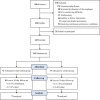Effects of a swallowing and oral-care program on resuming oral feeding and reducing pneumonia in patients following endotracheal extubation: a randomized, open-label, controlled trial
- PMID: 37438759
- PMCID: PMC10339550
- DOI: 10.1186/s13054-023-04568-6
Effects of a swallowing and oral-care program on resuming oral feeding and reducing pneumonia in patients following endotracheal extubation: a randomized, open-label, controlled trial
Abstract
Background: The resumption of oral feeding and free from pneumonia are important therapeutic goals for critically ill patients who have been successfully extubated after prolonged (≥ 48 h) endotracheal intubation. We aimed to examine whether a swallowing and oral-care (SOC) program provided to critically ill patients extubated from prolonged mechanical ventilation improves their oral-feeding resumption and reduces 30-day pneumonia incidence.
Methods: In this randomized, open-label, controlled trial, participants were consecutively enrolled and randomized to receive the SOC program or usual care. The interventions comprised three protocols: oral-motor exercise, sensory stimulation and lubrication, and safe-swallowing education. Beginning on the day following patient extubation, an SOC nurse provided the three-protocol care for seven consecutive days or until death or hospital discharge. With independent outcome assessors, oral-feeding resumption (yes, no) corresponded to level 6 or level 7 on the Functional Oral Intake Scale (censored seven days postextubation) along with radiographically documented pneumonia (yes, no; censored 30 days postextubation), abstracted from participants' electronic medical records were coded.
Results: We analyzed 145 randomized participants (SOC group = 72, control group = 73). The SOC group received, on average, 6.2 days of intervention (14.8 min daily) with no reported adverse events. By day 7, 37/72 (51.4%) of the SOC participants had resumed oral feeding vs. 24/73 (32.9%) of the control participants. Pneumonia occurred in 11/72 (15.3%) of the SOC participants and in 26/73 (35.6%) of the control participants. Independent of age and intubation longer than 6 days, SOC participants were likelier than their control counterparts to resume oral feeding (adjusted hazard ratio, 2.35; 95% CI 1.38-4.01) and had lower odds of developing pneumonia (adjusted odds ratio, 0.28; 95% CI 0.12-0.65).
Conclusions: The SOC program effectively improved patients' odds that oral feeding would resume and the 30-day pneumonia incidence would decline. The program might advance dysphagia care provided to critically ill patients extubated from prolonged mechanical ventilation.
Trial registration: NCT03284892, registered on September 15, 2017.
Keywords: Dysphagia; Endotracheal intubation; Extubation; Mechanical ventilation; Nurses; Oral feeding; Swallowing.
© 2023. The Author(s).
Conflict of interest statement
The authors declare that they have no competing interests.
Figures
References
Publication types
MeSH terms
Associated data
LinkOut - more resources
Full Text Sources
Medical



